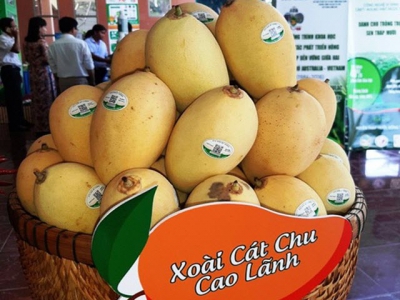Global market remains potential for Vietnams mango industry

The Ministry of Agriculture and Rural Development (MARD) in association with the People's Committee of Dong Thap Province, on April 12, held a workshop on improving the export capacity of Vietnam's mango industry, with the participation of international organizations, Mekong Delta provinces, institutes, exporting enterprises, and several mango cooperatives.
Cat Chu Mango is a kind of specialty mango of Dong Thap Province. (Photo: SGGP)
According to the report of the MARD, the Mekong Delta region has more than 47,000 hectares of all kinds of mango, with an average yield of 11-13 tons per hectare, and an output of about 567,732 tons per year. Among these, there are 1,789 hectares of mango grown under the VietGAP and GlobalGAP standards for export. In 2020, mango exports exceeded US$180 million. The Chinese market alone accounted for nearly 84 percent of total mango exports, followed by Russia, the US, South Korea, the EU, Australia, and Japan.
At the workshop, experts and exporters said that in the past year, the total global export value of mango reached about $12.3 billion, but Vietnam’s mango exports remained modest with more than $180 million. This shows the potential of the global mango demand.
Mr. Nguyen Dinh Tung, Chairman of Vina T&T Group Company, said that from April last year, his company had exported the first batch of mangoes with an output of 27 tons to the US by air and sea. In the first three months of this year, the company exported about 35 tons of mangoes a week. The current advantage is that mangoes have been licensed to be exported to the US and Australia with 30-day storage technology. At the same time, signed free trade agreements have helped Vietnam to easily access regional and global markets. Moreover, mango is available all year round with stable quality, so enterprises can take initiative in signing export contracts.
According to the MARD, by 2030, the whole country targets to have about 140,000 hectares of mango, with a production of 1.5 million tons, export turnover increasing to $650 million, and over 70 percent of processing and preservation establishments with advanced technologies.
The Department of Plant Protection suggested localities in the Mekong Delta continuing to register mango growing-area codes, apply good agricultural practices in production, and use plant protection drugs following recommendations. Packing and handling establishments must be periodically inspected and supervised and accepted by importing countries.
Deputy Minister of Agriculture and Rural Development Tran Thanh Nam said that the country currently has about 87,000 hectares of mango. Of which, the Mekong Delta accounts for 48 percent of the total growing area, which is a very good factor to improve quality and ensure export standards, as well as domestic consumption. To improve the quality standards of mango, the role of cooperatives is extremely important. Cooperatives are the hub to coordinate and link the value chain with exporters. Cooperatives will gather members to reorganize production associated with enterprises, forming a large raw material area to ensure quality according to the export requirements of many different markets.
Mr. Pham Thien Nghia, Chairman of the People's Committee of Dong Thap Province, revealed that from the years of 2005 and 2006, the province had focused on investing in the mango industry, such as building technical infrastructure and flood-protection dikes, applying technology to production, improving varieties, and producing under the GAP standards. Especially, it built the "my home mango tree" model to sell mangoes online. Since then, the concentrated mango growing areas were established in Cao Lanh District and Cao Lanh City.
Mango is also one of five commodities that the province has implemented agricultural restructuring. Currently, Dong Thap has 977.6 hectares of mango which have been granted growing-area codes for export to fastidious markets and 4,228 hectares of mango have been granted growing-area codes for export to China. The province has also established eight cooperatives, 37 cooperative groups, and 23 associations of mango farmers, linked the production and long-term consumption for 1,073 hectares of mango with more than 10 enterprises. However, the post-harvest loss rate is still quite high, sometimes up to 70 percent. The preservation of fresh mangoes has a high loss rate. The production area that meets the GAP standards is limited. These are problems that need to be overcome in the coming time.
Có thể bạn quan tâm
 Mekong Delta farmers put effort into elevating Vietnamese rice
Mekong Delta farmers put effort into elevating Vietnamese rice Entering April, farmers in Mekong Delta provinces are harvesting the last winter-spring rice fields of the total area of 1.5 million hectares
 Lychee origin traceability requires good implementation from production stage
Lychee origin traceability requires good implementation from production stage The competent agencies and districts in Bac Giang province have focused on instructing and supervising the lychee orchard owners
 Cassava exports enjoy surge in Q1
Cassava exports enjoy surge in Q1 Vietnam's export of cassava and cassava products stood at an estimated 1.07 million tonnes worth US$396 million during the first quarter of the year